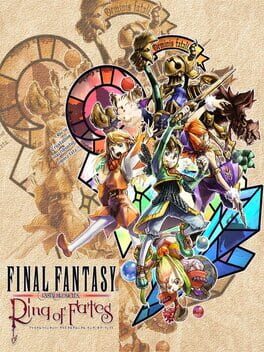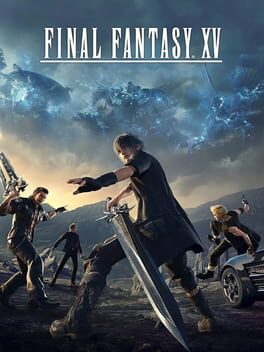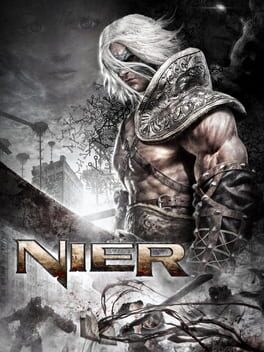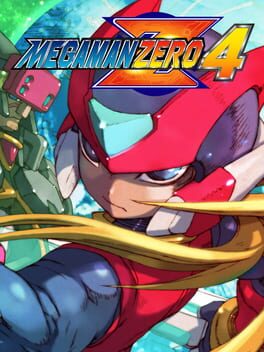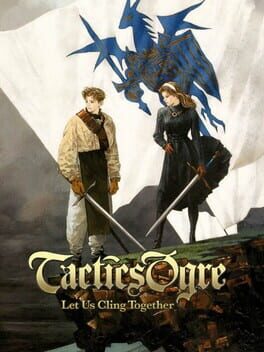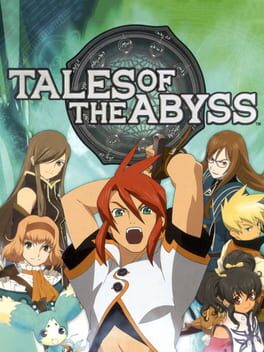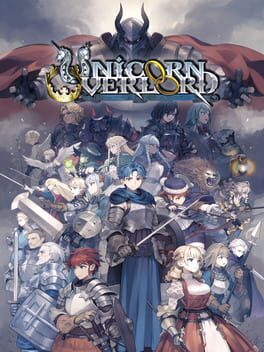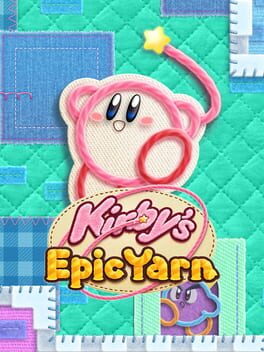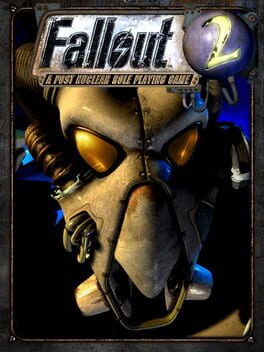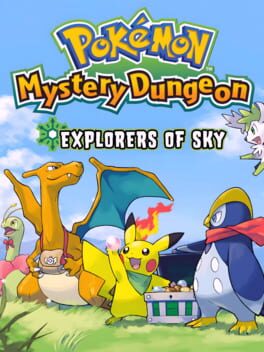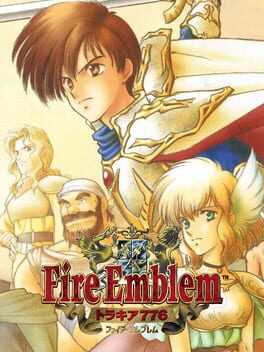YuushaBlues
994 Reviews liked by YuushaBlues
Certainly an interesting little game.
I can't speak to Crystal Chronicles on Gamecube but I quite liked this.
For a JRPG on DS this game has some decently deep mechanics. I was honestly surprised at how much I enjoyed playing this, I had no idea what to expect and often struggle with finding RPG gameplay engaging, but was pleasantly surprised with what's actually here.
Instead of being turn-based what we have is a little action platformer where each character has some different abilities.
Some characters have more uses than others but I found myself swapping around enough to feel the variety on display. Meeth the potionmaker has the most mechanics by far however not all of them are as functional in gameplay.
There's also a materia system that is accessed on the touchscreen, the idea is neat but it's barely used beyond spamming heal and revive.
The game is engaging, it certainly makes me want a bit more and frankly, I'll have to get around to the original on Gamecube and its sequel on DS at some point.
The story was better than I've come to expect from JRPGs and I'm usually very opposed to these types of games.
There's still the final fantasy tradition of at least two 30+ minute exposition dumps, but on the whole, I found the characters enjoyable and the story compelling.
Square has a sort of standard presentation on handhelds which consists of shifting between entirely text-based dialogue, to text and voiced in-engine cutscenes, and then a few rare pre-rendered cgi cutscenes sprinkled on top. It was the same in Crisis Core. It's a bit jarring a first but I came to like it. The variety of presentation styles can serve to highlight important moments and update the players internal model of how characters sound and the highs/lows of their emotional profile.
The pre-rendered cutscenes serve as punctuation marks and naturally show off that Square was once the undisputed master of presentation.
TL:DR I would recommend this game if you can snag a copy or get DS emulation to run without throwing up. The story is compelling enough and the gameplay will keep you engaged even if it never really challenges you.
I can't speak to Crystal Chronicles on Gamecube but I quite liked this.
For a JRPG on DS this game has some decently deep mechanics. I was honestly surprised at how much I enjoyed playing this, I had no idea what to expect and often struggle with finding RPG gameplay engaging, but was pleasantly surprised with what's actually here.
Instead of being turn-based what we have is a little action platformer where each character has some different abilities.
Some characters have more uses than others but I found myself swapping around enough to feel the variety on display. Meeth the potionmaker has the most mechanics by far however not all of them are as functional in gameplay.
There's also a materia system that is accessed on the touchscreen, the idea is neat but it's barely used beyond spamming heal and revive.
The game is engaging, it certainly makes me want a bit more and frankly, I'll have to get around to the original on Gamecube and its sequel on DS at some point.
The story was better than I've come to expect from JRPGs and I'm usually very opposed to these types of games.
There's still the final fantasy tradition of at least two 30+ minute exposition dumps, but on the whole, I found the characters enjoyable and the story compelling.
Square has a sort of standard presentation on handhelds which consists of shifting between entirely text-based dialogue, to text and voiced in-engine cutscenes, and then a few rare pre-rendered cgi cutscenes sprinkled on top. It was the same in Crisis Core. It's a bit jarring a first but I came to like it. The variety of presentation styles can serve to highlight important moments and update the players internal model of how characters sound and the highs/lows of their emotional profile.
The pre-rendered cutscenes serve as punctuation marks and naturally show off that Square was once the undisputed master of presentation.
TL:DR I would recommend this game if you can snag a copy or get DS emulation to run without throwing up. The story is compelling enough and the gameplay will keep you engaged even if it never really challenges you.
Final Fantasy XV
2016
Final Fantasy VIII
1999
NieR
2010
Mega Man Zero 4
2005
Tales of the Abyss
2005
Unicorn Overlord
2024
Kirby's Epic Yarn
2010
Fallout 2
1998
thracia is a game that really wants you to reexamine some behaviors and thoughts that you may have considered intrinsic to playing video games. is it worth it to strive for perfection? is fairness really the end goal of difficulty? is there really no honor in cheating? the most common statement you'll see about this game is that it's brutal, and the second most common statement you'll see about this game is that it's "just unfair to new players, but not that hard". neither of these statements are quite true; thracia is a very difficult game, and it is especially unkind to blind players, but it's paradoxically very effectively balanced. for the most part, this isn't a game where you're being put up against enemies way stronger than you, or a game where the enemies are given tons of toys you can't have. thracia is about trying to turn every disadvantage you're given into an advantage, and trying to win by choosing not to play within what the game presents as it's "rules" at all. to me, thracia feels very genuinely revolutionary in a way the prior 4 FEs, all also about revolutions, did not. the fatigue system means you are not allowed to be picky about your units, and you do not get your usual assortment of nobles and world-renown warriors. instead, you get a heck of a lot of bandits and sellswords, not to mention a handful of priests and illegitimate children. speaking of those bandits and priests, they are universally your MVPs in thracia. thracia has a very strong sense of materialism, both in it's plot and mechanics, which means that stealing and capturing weapons is simply your only option for acquiring weapons and money. this means that utility units are much stronger than in any other fire emblem game; not only because you have to steal to survive, but also because disarming is often a better option than just directly killing. why should i murder reinhardt when if i berserk him then sleep him i can get him to thin his troops and steal his gear? why should i bother fighting all these mages when i can send lifis in and just take all their books instead? this stuff brings a really interesting sense of resource management to thracia, and means that the player has theoretically nearly infinite opportunities to get good weapons, but has to gauge whether or not it's worth going for them each time they fight. this is furthered by making villages occasionally very difficult extras to get, and the addition of missable gaiden chapters help this greatly too. thracia has a very strong conception of risk vs reward; to simply clear the maps, you often have very easy and simple options, but simply clearing the maps is rarely enough. you are forced to take gambles to survive, but you are never expected to be perfect. a 100% playthrough of this game would likely increase the playtime by more than half off resets alone, but i don't think that that is a mistake or a negative. to me, thracia is rather genius in that it puts so much decisionmaking in the player's hands, and so little of that decisionmaking directly relates to killing. a good amount of your units can reliably crit, so cutting through enemies isn't something you need to worry too much about.. instead, what you're concerned with is not bleeding out on resources, making sure your units can avoid status effect spam, making sure you can have your units available when you need them. is it bullshit that you can be hit from halfway across the map by a sleep staff in enemy phase? sure. but i can silence that staffer, i can berserk them, i can steal their sleep staff.. you just have so many options, and just killing them is usually the least effective and least interesting one! in another strategy game, this sort of thing would be considered cheese, but here, it's life. you have the option to play "honorably" and fight like a man, sure, but are the enemies fighting honorably? hell no. fuck em. to me, this is exactly the sort of difficulty a strategy game should have. extremely lethal, extremely diverse, and not fair at all... but filled with options for interesting decisionmaking instead of just overstatting brute force ai. there is very little division between what you can do and what the ai can do. the defining difference is that you are not a bot.
STORY SPOILERS AHEAD
storytelling in thracia is another big strength. i think that the very restrained focus here helps a lot with character building and thematics. prior fire emblem games were all extremely grand continent-spanning high fantasy stories, which isn't a problem for those games at all, but i do feel that occasionally the macro scale of those stories meant that we could not feel the struggles of individual characters so closely. even mystery of the emblem, which does have a similar style of gameplay and a comparable story to thracia, is so zoomed out that i could hardly tell you what marth or caeda are feeling about what's happening. by contrast, leif is excellently built up, undergoing strong development through many losses. leif is someone who was born into natural conditions fit for traditional heroism, but is also someone who is given plenty reason to believe that his rebellion will only crush hope. prior lords had generally been characterized by naivety and great kindness; marth had been unable to accept that his allies had turned against him, sigurd had so much faith in the goodness of others that he ended up blind to conspiracy, celica loved alm so much that she was willing to suffer and sacrifice her cause for his sake. leif is anything but naive, and his kindness is often hardly virtuous. leif is racked with self-doubt at every turn, and when he is not, his ignorance and rash attitude bites him in the ass. he wants to save his people and repay the debts of his childhood at all costs, even though it has him taking on more than he can handle. his nobility alienates him from causes that much of his army is fighting for. many of his flaws would make him seem not so dissimilar from the friegian generals he's up against, but the important part is that leif learns from his mistakes as time goes on, and he never gives up. by the end of the game, his title of sage-lord doesn't feel farfetched. the enemy factions in thracia are also very well characterized. one detail i especially like is that the infamous thracian dracoknights rarely show up at all unless they're trying to seize an objective before you, and they're extremely lazy units. they don't leave their posts until you get in their range or split up your units, and they always leave the map when you kill their commander. this gets across very well that south thracia has little passion for the war they've been paid to fight in, they only see their alliance with the empire opportunistically. my only complaint with the story is that the final few chapters feel like a bit of afterthought or obligation story-wise, the audience just doesn't get a lot of in-universe justification for why the strategy is being executed the way it is, probably because it diverges from genealogy at this point. saving eyvel and defeating raydrik both make sense, but the loptrian church has very little personal relevance to the cast here. it didn't bother me because the last stretch of the game is sheer excellence from a gameplay perspective, but i do feel it's worth noting.
some minor notes i couldn't fit in here:
door key softlocks are really dumb and probably the single worst part of this game
chapter 12x and 14x are objectively quite poorly designed chapters for very different reasons; 12x is a chapter that feels almost deliberately designed for you to not engage with playing it, and 14x is a fog of war chapter that has long range troops and random pegasus knight spawns which can capture your units but you can't capture back. i think 14x is still effective narratively, but it's one of the only moments where i felt that thracia was sadistic in a way the player could not appropriately respond to or work around without foreknowledge or with clever strategy.
the variety in objectives is a huge plus for thracia and something i wish had been implented sooner. escape maps and survival maps are both awesome
STORY SPOILERS AHEAD
storytelling in thracia is another big strength. i think that the very restrained focus here helps a lot with character building and thematics. prior fire emblem games were all extremely grand continent-spanning high fantasy stories, which isn't a problem for those games at all, but i do feel that occasionally the macro scale of those stories meant that we could not feel the struggles of individual characters so closely. even mystery of the emblem, which does have a similar style of gameplay and a comparable story to thracia, is so zoomed out that i could hardly tell you what marth or caeda are feeling about what's happening. by contrast, leif is excellently built up, undergoing strong development through many losses. leif is someone who was born into natural conditions fit for traditional heroism, but is also someone who is given plenty reason to believe that his rebellion will only crush hope. prior lords had generally been characterized by naivety and great kindness; marth had been unable to accept that his allies had turned against him, sigurd had so much faith in the goodness of others that he ended up blind to conspiracy, celica loved alm so much that she was willing to suffer and sacrifice her cause for his sake. leif is anything but naive, and his kindness is often hardly virtuous. leif is racked with self-doubt at every turn, and when he is not, his ignorance and rash attitude bites him in the ass. he wants to save his people and repay the debts of his childhood at all costs, even though it has him taking on more than he can handle. his nobility alienates him from causes that much of his army is fighting for. many of his flaws would make him seem not so dissimilar from the friegian generals he's up against, but the important part is that leif learns from his mistakes as time goes on, and he never gives up. by the end of the game, his title of sage-lord doesn't feel farfetched. the enemy factions in thracia are also very well characterized. one detail i especially like is that the infamous thracian dracoknights rarely show up at all unless they're trying to seize an objective before you, and they're extremely lazy units. they don't leave their posts until you get in their range or split up your units, and they always leave the map when you kill their commander. this gets across very well that south thracia has little passion for the war they've been paid to fight in, they only see their alliance with the empire opportunistically. my only complaint with the story is that the final few chapters feel like a bit of afterthought or obligation story-wise, the audience just doesn't get a lot of in-universe justification for why the strategy is being executed the way it is, probably because it diverges from genealogy at this point. saving eyvel and defeating raydrik both make sense, but the loptrian church has very little personal relevance to the cast here. it didn't bother me because the last stretch of the game is sheer excellence from a gameplay perspective, but i do feel it's worth noting.
some minor notes i couldn't fit in here:
door key softlocks are really dumb and probably the single worst part of this game
chapter 12x and 14x are objectively quite poorly designed chapters for very different reasons; 12x is a chapter that feels almost deliberately designed for you to not engage with playing it, and 14x is a fog of war chapter that has long range troops and random pegasus knight spawns which can capture your units but you can't capture back. i think 14x is still effective narratively, but it's one of the only moments where i felt that thracia was sadistic in a way the player could not appropriately respond to or work around without foreknowledge or with clever strategy.
the variety in objectives is a huge plus for thracia and something i wish had been implented sooner. escape maps and survival maps are both awesome
